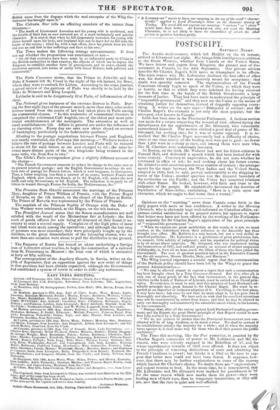POSTSCRIPT.
SATURDAY NIGHT.
The Acadia mail-steamer, which left Halifax on the 3d instant, arrived at Liverpool last night. She brings little intelligence in addition to the Great Western, whether from Canada or the United States. We have letters and papers from Kingston, the present seat of Go- vernment in Canada, to the 24th September. Our private advices describe Sir Charles Bagot's bold move as triumphant in its effects. The main reason why Mr. Lafontaine declined the first offer of office was, his doubt whether it was sincerely meant for acceptance : that
doubt was speedily removed. The representatives of the French Canadians already begin to speak of the Union, to which they were so hostile, as that to which they were indebted for having received for the first time at the hands of the British Government a large measure ofjustice. They had been made to understand the principle of "responsible government," and they now use the Union as the means of obtaining justice for themselves, iustead of doggedly opposing every- thing. A writer on the spot says—" Disloyalty is extinct ; and Sir Charles Bagot's Government is not only the most popular, but the strongest, ever known in Canada."
Little has been done in the Provincial Parliament. A factious motion was made for a return respecting the reward of 500/. offered during the disturbances for the apprehension of Mr. Girouard, who voluntarily surrendered himself. The motion elicited a good deal of praise of Mr. Girouard, but nothing else ; for it was of course rejected. It is re- marked that Sir Charles Bagot necessarily had a difficulty of choice, since at one time nearly all the leading men were put in gaol : no fewer than 1,200 were in custody at once, and among them were men who, like M. Cherrier, were notoriously innocent. At Boston, on the 30th, Mr. Webster had met his fellow-citizens in Faneuil Hall, and delivered a speech which had been looked for with some anxiety. Contrary to expectation, he did not state whether he continued in office or not : he said nothing about his future course. He alluded to still unsettled questions as sources of anxiety : the arrange- ments for the trade between the West Indies and the United States, adopted in 1830, had, he said, proved unfavourable to the shipping in- terest of the Union ; another question was the disputed boundary of the territories on the Pacific ; and the Union had unsettled relations with other States. He looked, however, with faith and trust to the judgment of the people. He emphatically denounced the doctrine of repudiation of State-debts; exclaiming, "Here is a stain upon our character, which we ought to feel worse than a wound."


























 Previous page
Previous page